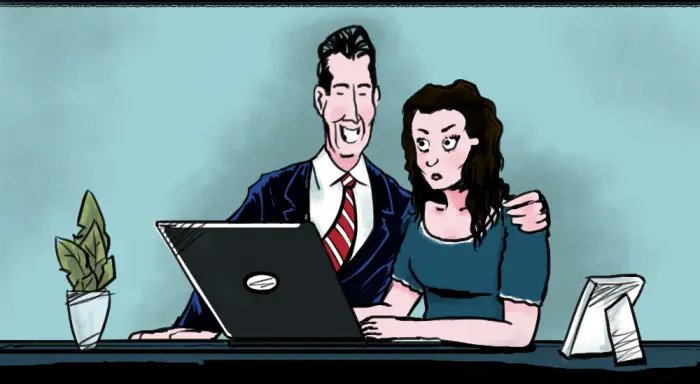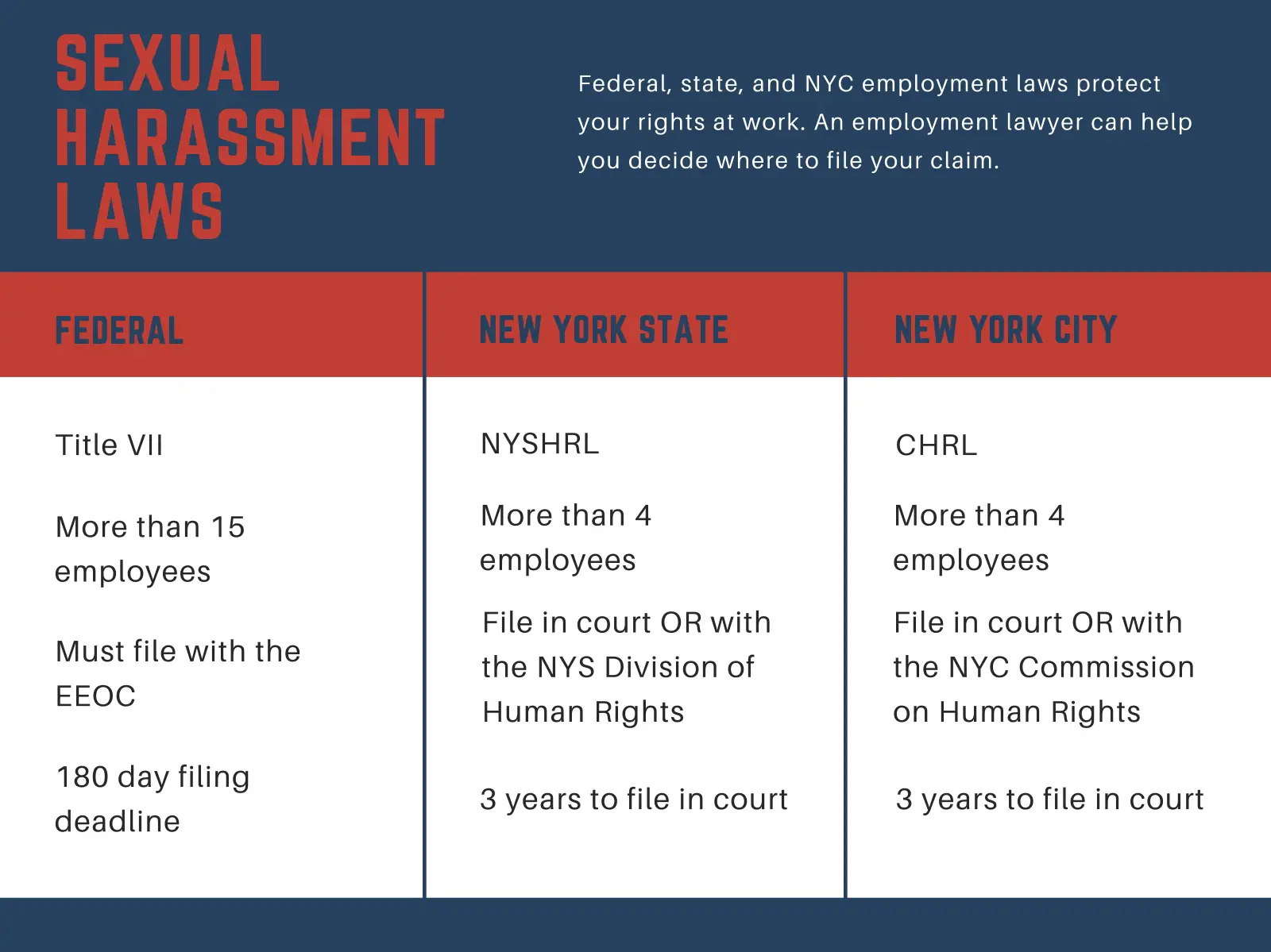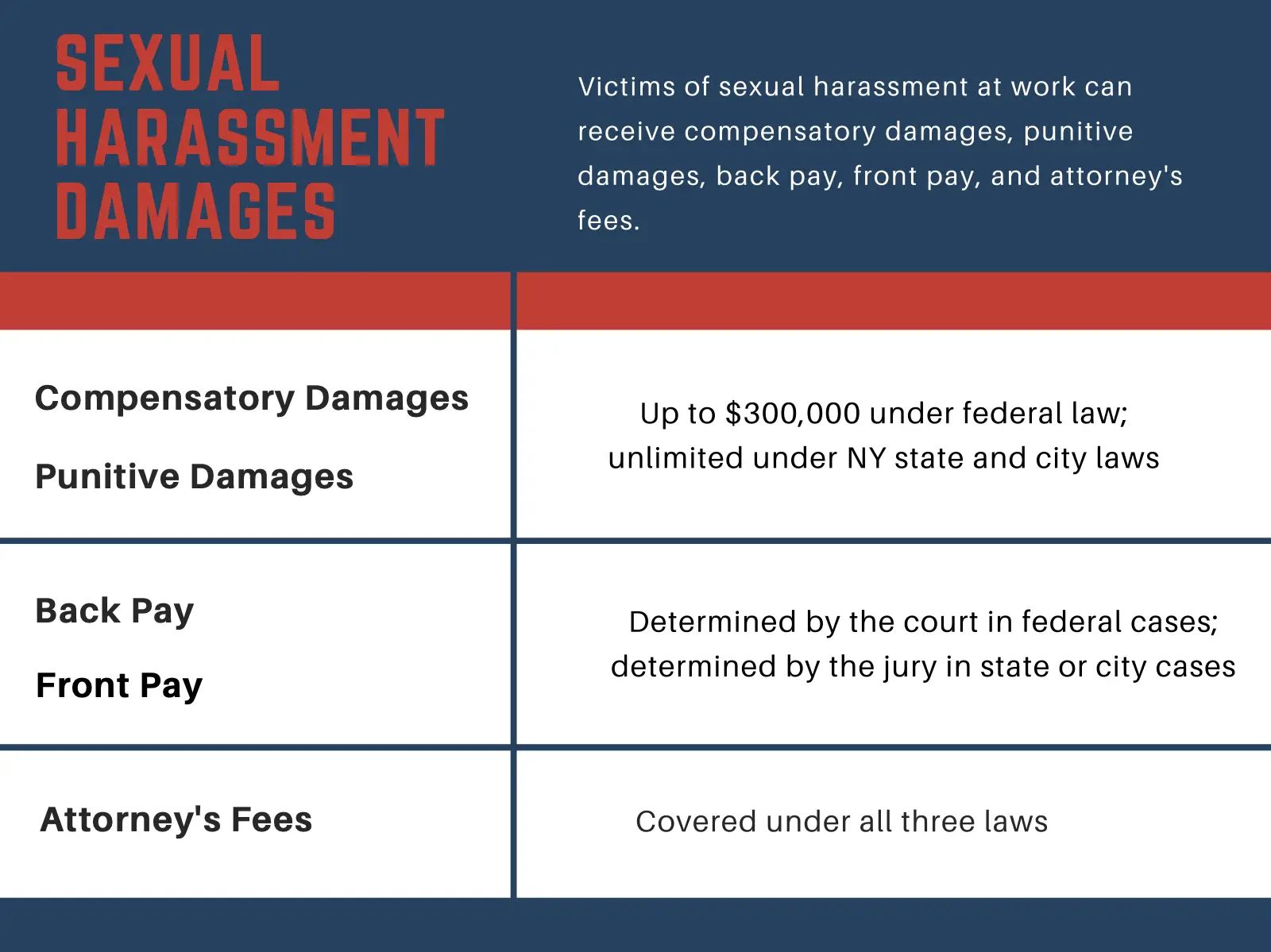Sexual Harassment in the Workplace
Protect Your Rights with a Sexual Harassment Lawyer
Sexual harassment in the workplace violates the law. But what is sexual harassment in the workplace?
Workplace sexual harassment can mean unwelcome sexual advances or requests for sexual favors. Verbal or physical harassment of a sexual nature also qualifies. And offensive remarks can be sexual harassment.
Are you struggling with how to handle sexual harassment in the workplace? A sexual harassment lawyer can help.
Charles Joseph has over twenty years of experience with sexual harassment cases, and his firm has recovered more than $200 million for clients. Contact New York sexual harassment lawyer Charles Joseph today for a free consultation. Consultations are always confidential.

Know Your Rights: What is Sexual Harassment in the Workplace?
Sexual harassment is a form of sex discrimination.
You are entitled to a working environment free from sexual harassment. Workplace sexual harassment is against the law.
Examples of sexual harassment in the workplace include pressuring coworkers to engage in a sexual relationship, making offensive comments at work, or unwanted physical contact.
Men can be the victims of sexual harassment.
Both men and women can be victims of sexual harassment, and both men and women can harass people. It is still sexual harassment if the victim and harasser are of the same sex. It is also illegal to sexually harass someone because they are transgender.
If you have been sexually harassed, you have protections under federal, state, and NYC sexual harassment laws. Sexual harassment lawyers can help protect your rights.
Examples of Sexual Harassment in the Workplace
Sexual harassment can include unwelcome sexual advances and sexual contact. Sexual harassment laws also address hostile work environments caused by sexual conduct or behavior.
Quid Pro Quo Sexual Harassment
Quid pro quo is a Latin term meaning “this for that.” In the context of sexual harassment laws, quid pro quo occurs when an employee’s boss or supervisor requires sexual favors for favorable employment decisions.
Examples of quid pro quo sexual harassment:
- A woman is up for a promotion at her company. Her supervisor pulls her aside to say that he can guarantee her promotion as long as she goes on a date with him.
- A male employee’s boss makes an unwelcome sexual advance. When the employee turns down his boss, she continues to make advances. After repeatedly saying no, the boss fires the employee.
- During the interview process for a competitive job, the hiring manager tells a female candidate that she will get the position as long as she has sex with the hiring manager.
Only supervisors and managers can be guilty of quid pro quo harassment. Legally, coworkers do not have the authority to grant or withhold benefits.
Learn more in our FAQ, What is Quid Pro Quo Sexual Harassment?
Unwanted Sexual Contact
Sexual harassment can also include unwelcome physical contact. If a coworker or supervisor instigates unwelcome contact by touching or purposefully brushing up against you, it may be sexual harassment.
Examples of unwanted sexual contact:
- A male coworker repeatedly tries to give his female coworker massages on the neck and shoulders. She asks him not to touch her, but he continues.
- A vendor hired by the company touches or rubs himself sexually in front of the company’s employees.
- While working in a shared space, an employee repeatedly brushes against a coworker in a sexual manner.
Because this form of sexual harassment does not involve employment decisions, the harasser does not have to be your boss. Coworkers, vendors, and even subordinates can be guilty of unwanted sexual conduct.
Verbal Sexual Harassment
Can sexual harassment be verbal? Yes, sexually explicit statements, sexual innuendos, and catcalls can be sexual harassment. Verbal sexual harassment also includes sexual remarks at work, unwanted personal questions, and spreading rumors about someone’s sex life.
Examples of verbal sexual harassment:
- A coworker brings up sex at work repeatedly, pressuring others to discuss sexual topics.
- A manager pressures an employee to talk about her sex life and her sexual preferences.
- Vendors on a worksite howl and make kissing sounds at employees.
Verbal sexual harassment can create a hostile work environment and violate workers’ rights.
Learn more in our FAQ, Can Sexual Harassment Be Verbal?
Workplace Sexual Harassment And Hostile Work Environment Protections
Sexual harassment can create a hostile work environment. Offensive comments, jokes, and slurs can all create a toxic workplace. That includes making offensive comments about gender or women in general.
While there’s no law against being a bad boss, rude comments can cross the line into sexual harassment. For example, if your boss singles out a particular gender for abuse, that could qualify as sexual harassment.
Hostile Conduct Must Be Unwelcome
Under federal and state law, the hostile conduct must be pervasive or severe to create a hostile work environment. However, New York City has a lower standard for a hostile work environment. In New York City, being treated less well than others, in a manner that is more than a “petty slight” or “trivial inconvenience,” qualifies as a hostile work environment.
It is important to speak up when you witness offensive conduct to make it clear that these comments are unacceptable and unwelcome.
Victims Do Not Have To Be The Targets
It is not true that hostile comments only harm their target. You can be a victim even if you are not the target of the offensive behavior. The law protects you even if you are not a member of the targeted gender. Men who witness hostile or sexual comments about women can also report the behavior or file a hostile work environment claim.
If the offensive behavior is affecting your ability to do your job, you may have a claim.
The Offender Does Not Have To Be Your Boss
It is not true that only your boss can create a hostile work environment. A coworker, a supervisor in another area of the company, or even a non-employee, like a vendor, can be the perpetrator.
Employers have a responsibility to prevent sexual harassment in the workplace.
A sexual harassment lawyer can help you determine whether your situation violates NYC hostile work environment protections or the protections in your area.
Sexual Harassment in the Workplace Can Be A Crime
Sexual harassment violates equal employment opportunity laws. And it can also be a criminal offense. The New York Penal Code applies if sexual harassment involves the following elements:
- Forcible Touching: Forcible touching means when someone intentionally, and for no legitimate purpose, forcibly touches your intimate parts for the purpose of degrading you.
- Criminal Sexual Act: A criminal sexual act occurs when someone engages in oral or anal sexual conduct with you without your consent. This can be a felony.
- Sexual Abuse: Sexual abuse is an attack that subjects you to sexual contact without your consent. This can be a felony.
- Persistent Sexual Abuse: Multiple acts of sexual abuse qualify as persistent sexual abuse. This can be a felony.
You can file a lawsuit for sexual harassment. Contact a sexual harassment lawyer to learn more about how to file a sexual harassment lawsuit.
How To Prove Sexual Harassment In The Workplace
Sexual harassment cases can be difficult to prove. So how should you handle harassment in the workplace? Proving harassment can feel overwhelming, but taking small steps right away can help.
If you experience sexual harassment at work, take these steps to protect yourself.
- Start keeping notes of the harassing conduct. Be specific in your details. Write down the time and place of each incident, what was said and done, and who witnessed the actions.
- Keep doing a good job. Make copies of your job evaluations and any letters or memos that show that you are doing a good job at work.
- Make it clear that the conduct is unwelcome, and make sure you can prove that you did. Contact your supervisor or human resources department, and put your complaints in writing.
- Check your company’s employee handbook. If your employer has a sexual harassment policy in place, follow it.
- Put all of your complaints in writing, and keep copies at home.
- Seek support from friends, family, or professionals. Harassment is stressful and can make you feel isolated and alone.
These steps will help with proving harassment and strengthen your case if you decide to file a sexual harassment lawsuit. Learn more by viewing What an Employment Lawyer Wants You To Know About Workplace Sexual Harassment.
If you still have questions about how to handle harassment at work or proving harassment, contact a New York sexual harassment lawyer for a free consultation.
Sexual Harassment in the Workplace and Retaliation
If you complain about sexual harassment, it is illegal for your employer to take any action against you.
It is illegal for employers to retaliate against applicants or employees who complain about discrimination against themselves or others. This includes filing a charge with the Equal Employment Opportunity Commission (EEOC) or any state or city agency.
Employers also cannot retaliate against employees who participate in an employment discrimination proceeding, such as an investigation or lawsuit. This includes acting as a witness.
You Are Protected From Retaliation Even If There Was No Harassment
As long as you had a good faith and reasonable belief that sexual harassment occurred, your employer cannot take any action against you for speaking out or participating in any investigation or proceeding. It does not matter if an agency or court determines that there was no discrimination.
If you speak out about harassment in your workplace, the law protects you from retaliation.
How to File a Sexual Harassment Lawsuit
If you file a lawsuit for sexual harassment, you have several options. You can file a complaint with the U.S. Equal Employment Opportunity Commission (EEOC), which handles violations of federal law. In addition, the New York State Division of Human Rights handles NYSHRL violations, and the New York City Commission on Human Rights investigates CHRL violations.
If your case falls under multiple sexual harassment laws, the three agencies that handle discrimination claims have a work-sharing agreement. This means they cooperate with each other to process your claims. There is no need to file a claim with each agency. You can indicate that you want your claim cross-filed with the other agencies.
You can also contact an employment lawyer to file a sexual harassment lawsuit. Learn more about how to file an EEOC complaint or contact a New York sexual harassment lawyer for help.
Comparing Sexual Harassment Laws
New York sexual harassment attorneys can file under multiple sexual harassment laws, including Title VII, the New York State Human Rights Law, and the New York City Human Rights Law.
If you’re wondering how to handle sexual harassment at work, contact New York sexual harassment lawyer Charles Joseph for a free, confidential consultation today.
Legal Remedies for Sexual Harassment
Victims of sexual harassment can recover damages, back pay, and fines from their employer. A New York sexual harassment lawyer can help protect your rights.
- Back Pay: The courts can award back pay equal to what you would have earned without the discrimination. This includes wages, bonuses, benefits, and more.
- Reinstatement: If you were fired or denied a promotion, the courts can order your employer to give you back your job or give you a promotion.
- Front Pay: The courts can award front pay to compensate for lost wages and benefits due to discrimination. The amount depends on the court’s determination of how long it will take for you to return to the same level of pay you had before the discrimination.
- Compensatory Damages: These damages “compensate” you for any out-of-pocket expenses caused by the discrimination. This includes the cost of therapy, lost wages, or the cost of searching for a new job. It can also include emotional pain and suffering.
- Punitive Damages: These damages punish the employer for their role in the discrimination. Under New York City law, employers who show negligence, recklessness, or a conscious disregard of your rights may have to pay punitive damages.
- Liquidated Damages: Under certain laws, victims of discrimination also qualify for liquidated damages equal to the amount of back pay owed.
- Attorneys’ Fees and Costs: If you win, your employer must pay your New York sexual harassment attorney for their work on your case. This includes expert witness fees and court costs.
Potential Damages Under Different Sexual Harassment Laws
A sexual harassment lawyer can help you deal with sexual harassment at work and maximize your damages in a sexual harassment lawsuit.
Sexual harassment attorney Charles Joseph offers free, confidential consultations. Reach out today to speak with a New York sexual harassment lawyer.


